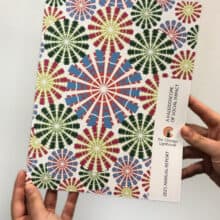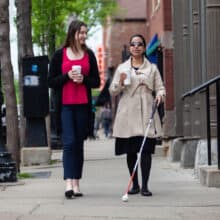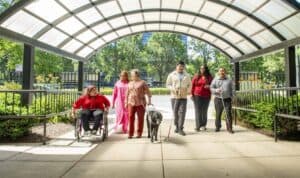Online vs. Traditional Higher Education: Which Is Better for Those With Disabilities?
Pursuing a college education has become much easier for everyone thanks to online courses. A study done by Walden University and the University of Phoenix suggests that many college students with disabilities prefer online courses over traditional classroom education to avoid stigmatization and because of several other positive aspects. Over half of the 35 study participants said their experiences with online courses far outweighed the isolation and stress they often experienced in classrooms.
There are many conveniences to taking online courses, regardless of whether or not a student is disabled. For one, they can complete these courses at their own time and pace – there’s no need to worry about whether or not they’ll make it to class on time! Students who live in rural areas or are not close to colleges have an even greater advantage because they can still obtain a higher education thanks to online classes. The Internet now makes it possible for them to go to college even if they are not near one.
These and other conveniences can be of even greater importance for students with disabilities. One of the biggest challenges I and others with disabilities encounter is finding adequate transportation. As a college student at Urbana-Champaign, I was extremely fortunate to live near a fairly accessible bus system, but many college towns aren’t as accommodating. By enrolling in online classes, students with disabilities don’t have to worry about this. Flexibility is probably the next most important consideration. In some cases, disabled students have to deal with situations that might be unpredictable or that might conflict with their schedules. If students have health or other concerns, then online courses give them the flexibility and opportunity to recover without having to worry about missing class.
I never considered enrolling in online courses as a college student. In fact, I was somewhat hesitant to give it a try for fear that they wouldn’t be accessible even with my assistive technology. Besides, I had always wanted to go to a four-year university to meet and socialize with other people. To me, a well rounded college experience should consist of both an academic and social life. I also knew that as a journalist I would do a great deal of interacting with others, so the social aspect of higher education was also important for that reason. Socializing can be as simple as exchanging thoughts and experiences with classmates, and this can eventually lead to networking and other opportunities. As those of us in the workforce now know, this is very important if we want to find and keep a job!
The feedback from my professors was equally important. I have always been a hands-on learner, so of course getting face to face feedback and instruction was critical to my success. While we can easily get feedback from professors and classmates through email, there are times when that simply isn’t enough. Meeting face to face with professors gives students the opportunity to exchange ideas and comments right then and there. In the professional world, we all have to be able to give and accept feedback and even constructive criticism from our co-workers and supervisors, and the college environment gives us the right opportunity to practice this very important skill.
Although my experience attending a four-year university was not perfect, it was very positive and worked out well. I would strongly recommend anyone who has the opportunity to pursue a traditional college education in the classroom setting to take advantage of it. Part of the beauty of attending college is the chance you get to socialize with others, and I think this is not always possible with online courses. That’s not to say that online education is isolating, however. Students and professors can interact easily thanks to instant video and messaging tools. I think that if colleges and universities find a good balance between the traditional and virtual classroom, everyone can benefit from both methods.
I also understand that not all situations are the same, particularly when disabilities come into play. Online courses can provide more convenience and flexibility to students with disabilities who would otherwise might not be able to pursue a higher education. I encourage current and future students to choose whatever method they are more comfortable with. After all, the ultimate goal for most of us is to learn and succeed in our chosen fields, and this means different things to different people.





